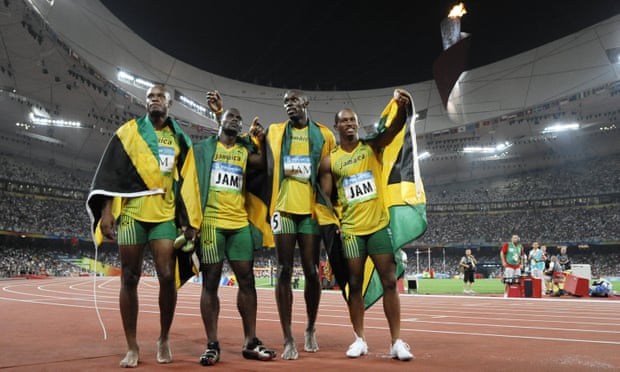FOR
VEIWERS&CUSTOMERSAIRTEL CARD : 7875867942431937
ETISALAT CARD : 464559557016708
Methylhexanamine reportedly found in retested 2008 Olympics sample
• Jamaica Olympic Association says it has not been notified of any rule violation

The Jamaican sprinter Nesta Carter was reported to have returned an
anti-doping violation for the banned stimulant Methylhexanamine. If
ultimately proved, team-mates including Usain Bolt face losing their 4x100m relay gold medals from the 2008 Olympic Games in Beijing.
According to Reuters, traces of the drug are reported to have been found in Carter’s A sample when 454 frozen blood and urine samples from Beijing were retested by the International Olympic Committee last month. Carter will face sanctions if his B sample, which was due to be reanalysed earlier this week, is also shown to be positive.
However, the Jamaica Olympic Association president, Michael Fennell, said he had not yet received “any official communication concerning reports in the media about the B sample testing of any athlete” on Friday afternoon – while the Jamaica Athletics Administrative Association president, Warren Blake, insisted his organisation had not been notified of any rule violation. The Guardian was unable to speak to Carter’s agent, despite a number of attempts. The 30-year-old Carter has been a vital member of Jamaica’s 4x100m relay team for nearly a decade, running the first leg as they won gold medals at the 2008 and 2012 Olympic Games and the 2011, 2013 and 2015 world championships. He has not run this season, citing a foot injury, but is expected to race in the next few weeks before Jamaica’s Olympic trials, which start later this month.
Although none of the other members of Jamaica’s 4x100m squad in 2008, which included Bolt, Asafa Powell and Michael Frater, are accused of doping, if the news is confirmed the IOC could strip them of their title.
All members of the gold medal-winning US 4x400m relay squad at the 2000 Sydney Olympics were subsequently stripped of their medals after Antonio Pettigrew admitted a doping offence. However, when the American Marion Jones was stripped of her two relay medals from the Sydney Games for doping offences, her team-mates kept theirs after an appeal to the court of arbitration for sport.
The IOC spokesman Mark Adams said discussions over what to do with the medals won by any dope cheats exposed by the retesting were continuing. “It is still being worked out,” he added. “What we want to do, and are trying to do, is target athletes who have positive results and stop them from competing in Rio.”
Methylhexanamine has been on the World Anti-Doping Agency code prohibited list since 2004, although it was reclassified on the 2011 list as a “specified substance”.
Wada defines specified substances as those that are more susceptible to a “credible, non-doping explanation”. Sold as a nasal decongestant in the US until 1983, Methylhexanamine has been used more recently as an ingredient in dietary supplements.
Historically, the sanction for the use of Methylhexanamine has been a suspension of six months to a year and the loss of results from the period concerned.
According to Reuters, traces of the drug are reported to have been found in Carter’s A sample when 454 frozen blood and urine samples from Beijing were retested by the International Olympic Committee last month. Carter will face sanctions if his B sample, which was due to be reanalysed earlier this week, is also shown to be positive.
However, the Jamaica Olympic Association president, Michael Fennell, said he had not yet received “any official communication concerning reports in the media about the B sample testing of any athlete” on Friday afternoon – while the Jamaica Athletics Administrative Association president, Warren Blake, insisted his organisation had not been notified of any rule violation. The Guardian was unable to speak to Carter’s agent, despite a number of attempts. The 30-year-old Carter has been a vital member of Jamaica’s 4x100m relay team for nearly a decade, running the first leg as they won gold medals at the 2008 and 2012 Olympic Games and the 2011, 2013 and 2015 world championships. He has not run this season, citing a foot injury, but is expected to race in the next few weeks before Jamaica’s Olympic trials, which start later this month.
Although none of the other members of Jamaica’s 4x100m squad in 2008, which included Bolt, Asafa Powell and Michael Frater, are accused of doping, if the news is confirmed the IOC could strip them of their title.
All members of the gold medal-winning US 4x400m relay squad at the 2000 Sydney Olympics were subsequently stripped of their medals after Antonio Pettigrew admitted a doping offence. However, when the American Marion Jones was stripped of her two relay medals from the Sydney Games for doping offences, her team-mates kept theirs after an appeal to the court of arbitration for sport.
The IOC spokesman Mark Adams said discussions over what to do with the medals won by any dope cheats exposed by the retesting were continuing. “It is still being worked out,” he added. “What we want to do, and are trying to do, is target athletes who have positive results and stop them from competing in Rio.”
Methylhexanamine has been on the World Anti-Doping Agency code prohibited list since 2004, although it was reclassified on the 2011 list as a “specified substance”.
Wada defines specified substances as those that are more susceptible to a “credible, non-doping explanation”. Sold as a nasal decongestant in the US until 1983, Methylhexanamine has been used more recently as an ingredient in dietary supplements.
Historically, the sanction for the use of Methylhexanamine has been a suspension of six months to a year and the loss of results from the period concerned.
No comments:
Post a Comment